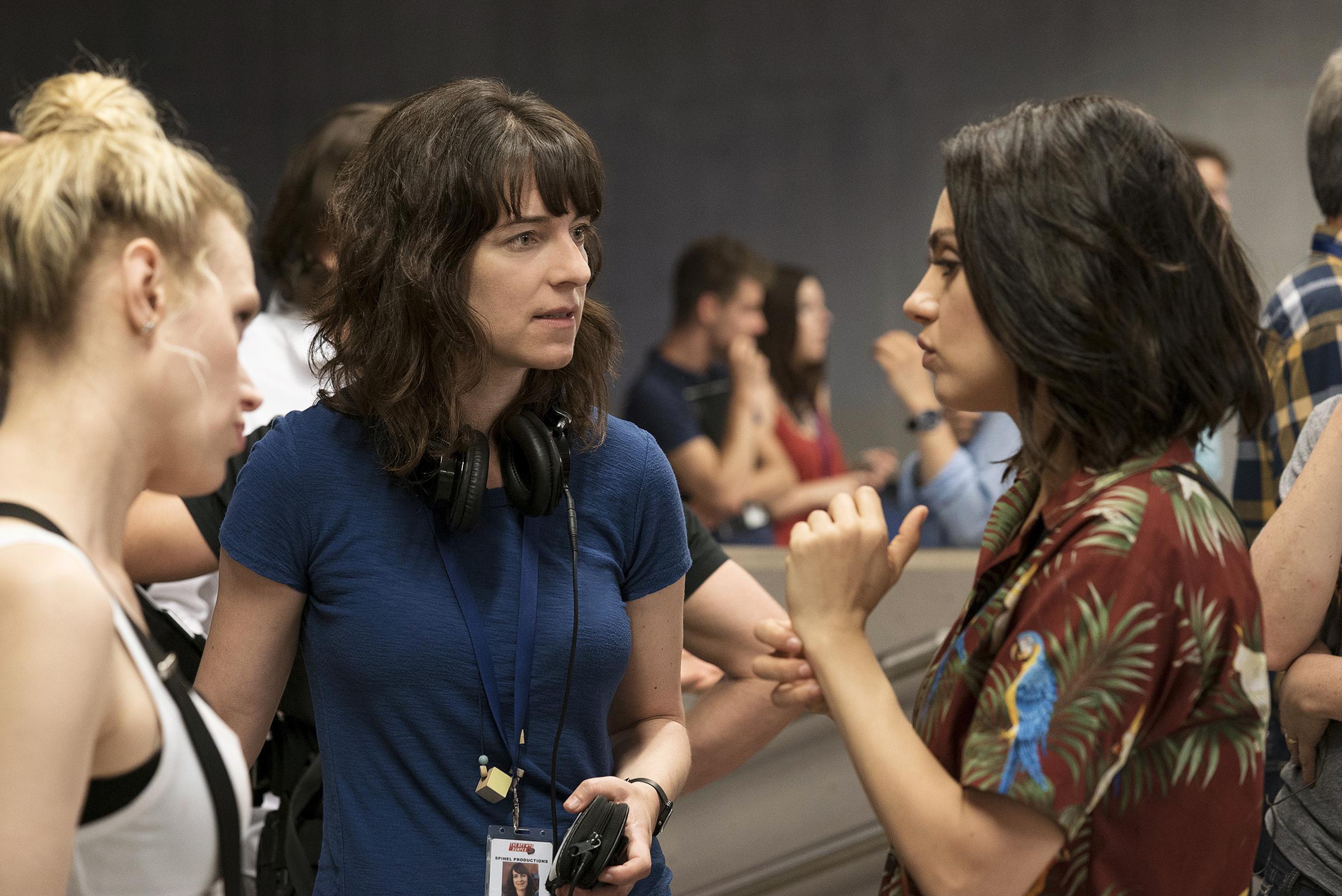
With bad guys hot on their heels, Jersey girls Audrey and Morgan take momentary cover in the bathroom of a Vienna train station. Audrey turns to leave–their lives depend on catching the next train to Prague–but Morgan has something urgent to say. Her best friend just tricked one bad guy and shot another to protect her. “Can we just take a moment to appreciate you?” she says, gripping Audrey’s arms. “Woman, you are incredible, and I want you to own it.”
Audrey, played by Mila Kunis in the upcoming action-comedy The Spy Who Dumped Me, out Aug. 3, always downplays her accomplishments. Morgan, an avowed feminist and aspiring actor played by Kate McKinnon, wants her to stand tall. But the roles are reversed in an interview over breakfast in New York City. McKinnon lowers her voice to share that she was just nominated for a fifth Supporting Actress Emmy for her work on Saturday Night Live. (She won in 2016 and 2017.)
“It’s not my year, mark my words,” says McKinnon, who has gained a loyal following in particular for her hyperbolic impressions of Hillary Clinton, Justin Bieber and other larger-than-life characters.
“You’re winning,” Kunis says, scooting closer to McKinnon. “This girl is never going to accept a compliment.”
The parallels between this real-life friendship and the one in The Spy Who Dumped Me are hard to miss. In the movie, Audrey discovers that the boyfriend who broke her heart is a CIA agent on the run. When he shows up unexpectedly at Audrey and Morgan’s apartment, the friends fall headfirst into a treacherous international spy game. But the movie diverges from its genre counterparts in one major way: it prioritizes friendship over bloodshed or romance. As Audrey and Morgan stumble across Europe trying to stay one step ahead of the enemy–picking up some impressive spy skills along the way–they always make time to cheer each other on, as did the actors on set.
“I feel very voyeuristic telling you this,” says Susanna Fogel, the director and co-writer, “but my editor would call me because when they had their mics on between takes, you would hear these little conversations. We’d listen to audio clips of them telling each other how impressed they are with each other.” Fogel observed Kunis take a “big-sisterly role” with McKinnon, who is newer to leading major films.
Female friendship has become something of a hallmark for Fogel, who co-wrote and directed 2014’s Life Partners, about what happens when one friend gets involved in a serious romantic relationship. She also created the television show Chasing Life, about how a woman and her best friend handle her cancer diagnosis.
Fogel herself has many friends who, like her, are in their 30s, are not married and don’t have kids. “Our friendships are really the epicenter of our social world and emotional lives,” Fogel says. Yet the platonic bonds she has seen celebrated on screen have largely been between male friends. “There was that whole class of Judd Apatow male buddy movies,” Fogel says. “We just didn’t have our version.”
Kunis says she signed on to co-star in The Spy Who Dumped Me in part because McKinnon was already attached–even though the two had never met. Glancing over at Kunis, McKinnon says she had worried that Kunis would find her too weird. “Did you really think this? This is the first I’m hearing this,” Kunis asks. “She’s crazy–don’t get me wrong–but awesome. She’s just, like, a f-cking kook, man, and it’s beautiful.”
They spend nearly eight minutes listing everything they love about each other. Kunis, according to McKinnon, is amazingly normal, considering her level of success in Hollywood, and has a “mayoral quality” about her. McKinnon, as a master comedian, is eerily observant, Kunis says.
“I just look at you and I’m like, God, I want to be more like her,” McKinnon says. “And I look at Kate and want to be more like her,” Kunis says. “That’s what a friendship is,” McKinnon says.
One aspect of the script that appealed to McKinnon was the absence of a typical page-75 falling-out scene, where the two friends break apart so they can later come back together in the climax. Instead of manufacturing a conflict between Audrey and Morgan in order to move the plot forward, Fogel filled those pages with scenes of inside jokes and moments when they build each other up as they master new moves like hacking databases and battling assassins.
Both actors can relate to their characters’ bond. Each still lives where she grew up–Kunis in Los Angeles, McKinnon in New York–and has maintained lifelong ties with a circle of women. One of McKinnon’s childhood friends got married recently, and she cried at the wedding, thinking about how lucky they were to still be connected. “I know what their moms’ couches smell like. I remember their landline phone numbers,” she says. “I feel like I’ve been keeping secrets if I don’t see them for too long.”
“If I killed somebody,” Kunis adds, “I have zero doubt that if I called my best friend and was like, ‘Hey, grab a shovel,’ she wouldn’t even ask a question.”

Halfway through her grain-and-egg bowl, Kunis drops her spoon and launches into a “rant” (her word). After three female-driven films–Bad Moms, A Bad Moms Christmas and now The Spy Who Dumped Me–she’s feeling “triggered,” she says. She’s tired of being asked about what it’s like to act with other women, and for this film, what it was like to be directed by one. (Fogel is the first female solo director Kunis has worked with.)
“I said as a joke once that there was no yelling,” Kunis begins, hands waving. “Never in my 20 years has anyone asked what it’s like working with a man. No one goes to Will Ferrell and says, ‘Hey, Will Ferrell, what’s it like making a buddy comedy?’ With Bad Moms, I literally was like, ‘Oh my God, I can’t.’ What’s it like making a movie that’s all women? Gosh, women are 51% of us in this world. It’s not like it’s a snow leopard coming onto set–it’s just a woman.”
McKinnon grabs Kunis’s clenched hand. “That’s another thing I love about you–you’re such a f-cking firecracker,” she says. “We understand that it’s noteworthy now. The dream would be to have it not be.”
For her part, Fogel does describe bringing something different to the process as a female director–and she is one of only a few with a studio tentpole out this summer. Threading the needle between two genres, action thrillers and raunchy comedies, that have been long dominated by male creators, Fogel co-wrote the story with David Iserson with real women in mind. “You can have a lot of destruction, but in a realistic female movie, the women are going to be aware of that destruction and apologizing for it,” Fogel says, adding that she’s never been a huge fan of action-comedies either because the action lacks intensity or the comedy that follows feels like it’s in poor taste.
That’s not to say the violence in The Spy Who Dumped Me is half-hearted: at times, as in an early scene in a restaurant that ends with a death by fondue-drowning, it’s as outrageous as the best action movies. Fogel worked closely with her stunt coordinator to try to choreograph scenes that are visceral and intense without triggering images of gun violence that might disturb viewers, particularly in the U.S. “We kind of surprised ourselves as these hyperviolent action sequences poured out of us,” Fogel says. “It seemed like there was an opportunity to just play in that sandbox with confidence, and yet always with my perspective being that of a woman.”
Even so, Fogel, whose background is mostly in independent movies, had moments of doubt helming a big action-comedy. “When I’d think about it too hard, I’d get really freaked out that I was going to ruin it, lose a lot of people a lot of money and be a big disappointment that ruined it for all women in the future,” she says. Now, on the other side of the project–and with buzz surrounding its impending release–she knows everything is O.K. “I hope that women know that they can and should try everything they’re interested in–with the confidence that men have had,” she says.
As breakfast winds down, McKinnon steals a few last berries off my plate and shares her favorite scene: when Audrey and Morgan are interrogated and frantically spill each other’s secrets. (Morgan had lice as an adult; Audrey sold her dad’s pills at Coachella.) McKinnon’s own friends know too much about her, she says–and it’s a good thing: “How could you live if you didn’t have that?”
More Must-Reads From TIME
- The 100 Most Influential People of 2024
- The Revolution of Yulia Navalnaya
- 6 Compliments That Land Every Time
- What's the Deal With the Bitcoin Halving?
- If You're Dating Right Now , You're Brave: Column
- The AI That Could Heal a Divided Internet
- Fallout Is a Brilliant Model for the Future of Video Game Adaptations
- Want Weekly Recs on What to Watch, Read, and More? Sign Up for Worth Your Time
Write to Lucy Feldman at lucy.feldman@time.com